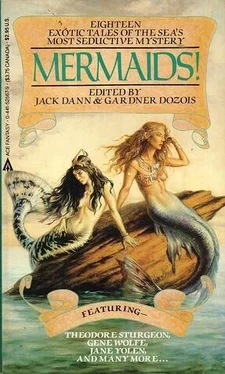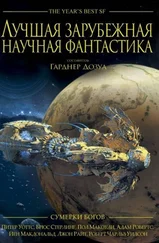Гарднер Дозуа - Mermaids!
Здесь есть возможность читать онлайн «Гарднер Дозуа - Mermaids!» весь текст электронной книги совершенно бесплатно (целиком полную версию без сокращений). В некоторых случаях можно слушать аудио, скачать через торрент в формате fb2 и присутствует краткое содержание. Год выпуска: 1986, ISBN: 1986, Издательство: Ace, Жанр: Фантастика и фэнтези, на английском языке. Описание произведения, (предисловие) а так же отзывы посетителей доступны на портале библиотеки ЛибКат.
- Название:Mermaids!
- Автор:
- Издательство:Ace
- Жанр:
- Год:1986
- ISBN:0-441-52567-9
- Рейтинг книги:5 / 5. Голосов: 1
-
Избранное:Добавить в избранное
- Отзывы:
-
Ваша оценка:
- 100
- 1
- 2
- 3
- 4
- 5
Mermaids!: краткое содержание, описание и аннотация
Предлагаем к чтению аннотацию, описание, краткое содержание или предисловие (зависит от того, что написал сам автор книги «Mermaids!»). Если вы не нашли необходимую информацию о книге — напишите в комментариях, мы постараемся отыскать её.
Mermaids! — читать онлайн бесплатно полную книгу (весь текст) целиком
Ниже представлен текст книги, разбитый по страницам. Система сохранения места последней прочитанной страницы, позволяет с удобством читать онлайн бесплатно книгу «Mermaids!», без необходимости каждый раз заново искать на чём Вы остановились. Поставьте закладку, и сможете в любой момент перейти на страницу, на которой закончили чтение.
Интервал:
Закладка:
"Then felt I like some watcher of the skies," he muttered to himself, "When a new planet swims into his ken; or like stout Cortez, when with eagle eyes, he stared at the Pacific—and all his men..." He groped for a moment for the final two lines, as he studied the bluff. "Looked at each other with a wild surmise—silent, upon a peak in Darien."
"Stout Cortez" chuckled as he clambered down the bluff with his tape recorder bumping his side. He was no rock climber, but the slope was neither high enough nor sheer enough to require one. He imagined himself describing his adventure in the faculty lounge. It was nothing .
Nothing too was the evidence he found on the beach, in some places hardly wider than a footpath, that wound along the base of the bluff. There were a few seashells and a rusty tin that had once held British cigarettes, but that was all. No cast off bikini, no abandoned beach towel, no footprints, nothing.
He looked up to see a tall and rather angular woman with a canteen at her hip walking silently toward him along the strip of damp sand. He greeted her in his halting Greek, and she extended her right hand in a regal gesture, saying in English, "And a good morning to you, Doctor. I am Dr. Thoe Papamarkos. I am of the University of Athens. You are Dr. Cooper, and you are of an American university, but they do not know to tell me which."
"The University of Nebraska at Lincoln. Pleased to meet you, Dr. Papamarkos." The Nebraskan was Lincolnesque himself, tall and pleasantly ugly.
"And you are a folklorist. You must be, from what they report of you, that you walk about all day, ask questions of old people, make recordings of their stories."
"That's right," he said. "And you?"
She laughed softly. "Oh, no. I am not the competition, as you fear."
"Good!" He smiled.
She touched the third button of her khaki shirt. "An archaeologist, I am. Do you know of Saros?"
He shook his head. "I know this is the Saronic Gulf," he said, "and I suppose it must be named after something. Is it an island?"
"No. It was a city, a city so long ago that even in the time of Socrates there was nothing left but ruins and a temple for Poseidon. Think on it, please, Doctor. You and I, we think of that time, the Age of Pericles, as ruins. But to them, to Pericles and Plato, Themistocles and Aristeides the Just, Saros was ancient, Saros was archaeology. Now I dig, with three men from the village to work for me. About five kilometers that way. There I hear of you, stories of the folklorist, and I think we should know of each other, probably we are the only truly educated people on this part of the coast, perhaps someday we may even help each other. No?"
"Yes," he said. "Certainly." He discovered that he liked her. She was an old-maid schoolteacher, no doubt about it, with her graying hair tightly knotted in a bun. She could be Miss Twiddle from "The Katzenjammer Kids" or the Miss Minerva of Miss Minerva and William Green Hill . And yet—
"And you," she said. "Folklore is so interesting. What is it that you do?"
He cleared his throat as he tried to think of some way to explain. "I'm trying to trace the history of the Nereids."
"Truly?" She looked at him sidelong. "You believe they were real?"
"No, no." He shook his head. "But do you know about them, Dr. Papamarkos? Do you know who they were?"
"I, who search for the temple of Poseidon? Of course. They were the ladies, the maids in waiting at his court, under the Aegean. He was one of the oldest of all the old Greek gods. They were old too, very old, the Greek—what do you call them in English? Mermaids? Sea fairies? Tell me." She hesitated, as though embarrassed. "I understand your English much better than I speak it, you must believe me. I was three years, studying at Princeton." She unhooked the canteen from her belt and unscrewed the top.
He nodded. "I'm the same way with Greek. I understand it well enough; I couldn't do what I do if I didn't. But sometimes I can't think of the right word, or remember how it should be pronounced."
"You do not want a drink of my water, I hope. This is so very warm now, but I have a nose disease. Is that what you call it? I must take my medicine to breathe, and my medicine makes me thirsty. Do you wish for some?"
"No thanks," he said. "I'm fine."
"And did I say it correctly? Mermaids?"
"Yes, mermaids. Specifically, they were a class of nymphs, the sea nymphs, the fifty daughters of Nereus. There were mountain nymphs too, the Oreads; and there were Dryads and Meliae in the trees, Epipotamides in the rivers, and so forth. And old people, rural people particularly..."
She laughed again. "Still credit such things. I know, Doctor, and I am not embarrassed for my country. You have these too, but with you it is the flying saucers, the little green men. Why should not my Greece have its little green women?"
"But the fascinating part," he said, warming to his subject, "is that they've forgotten all the names except one. Modern Greeks no longer talk about nymphs, or Oreads, Dryads, or Naiades. Only of Nereids, whether they're supposed to have been seen in springs, or caves, or whatever. I'm trying to find out just how that happened."
She smiled. "Have you thought, perhaps only they still live?"
When the Nebraskan got back to his tiny inn in Nemos, he stopped its dumpy little maid of all work and mustered his uncertain Greek to ask her about Dr. Papamarkos.
"She does not live here," the maid informed him, staring at the toes of his boots. "Over there. She has a tent." She ducked through a doorway and vanished; it was not until some time afterwards that it occurred to him that the Greek word for a tent also meant stage scenery.
On the stairs, he wondered again if it might be possible. Dr. Papamarkos taking off her heavy belt, the soldierish pants and shirt. Flitting naked through the woods. He chuckled.
No. The woman he had seen—and he had seen a woman, he told himself—had been younger, smaller, and—um—rounder. He suddenly recalled that Schliemann, the discoverer of Troy, had married a Greek girl of nineteen at the age of forty-seven. He himself was still years short of that.
The thought returned the next time he saw her. It was at almost the same spot. (He had been frequenting that spot too much, as he kept telling himself.) He heard a noise and turned, but not quickly enough. The faint splash came again. Once more he hurried, actually running this time, to the edge of the little bluff; and this time he was rewarded. A laughing face bobbed in the waves fifty yards out, a face circled by dark and floating hair. An arm rose from the sea, waved once, and was gone.
He waited five minutes, occasionally glancing at his watch. Ten. The face did not reappear, and at last he scrambled down the bluff to stand upon the beach, staring out to sea.
"Doctor! Doctor!"
He looked around. "Hello, Dr. Papamarkos. What a pleasure to meet you again." She was coming from the other direction this time, the direction of Nemos and his inn, and she was waving something above her head. It really was a pleasure, he realized. A sympathetic ear, an older woman, no doubt with a certain amount of experience, who knew the country ... "Good to see you!"
"And to see you, my friend. Oh, Doctor, my friend, look! Just look and see what we have found under the water."
She held it out to him, and after a moment he saw it was a glazed cup, still somewhat encrusted with marine growths.
"And it is to you that I owe, oh, everything!"
The background was red, the man's head black, his curling beard and wide, fierce eye traced in a lighter color that might originally have been white. A fish, small and crude, swam before his face.
"And on the back! See, beside the trident, the two straight scratches, the bar at the top? It is our letter π, for Poseidon. They have finer cups, oh, yes, much finer, at the museum in Athens. But this is so old! This is Mycenaean, early Mycenaean, from when we were yet copying, and badly, things from Crete."
Читать дальшеИнтервал:
Закладка:
Похожие книги на «Mermaids!»
Представляем Вашему вниманию похожие книги на «Mermaids!» списком для выбора. Мы отобрали схожую по названию и смыслу литературу в надежде предоставить читателям больше вариантов отыскать новые, интересные, ещё непрочитанные произведения.
Обсуждение, отзывы о книге «Mermaids!» и просто собственные мнения читателей. Оставьте ваши комментарии, напишите, что Вы думаете о произведении, его смысле или главных героях. Укажите что конкретно понравилось, а что нет, и почему Вы так считаете.











![Гарднер Дозуа - Книга Мечей (сборник) [litres с оптимизированной обложкой]](/books/427839/gardner-dozua-kniga-mechej-sbornik-litres-s-opti-thumb.webp)